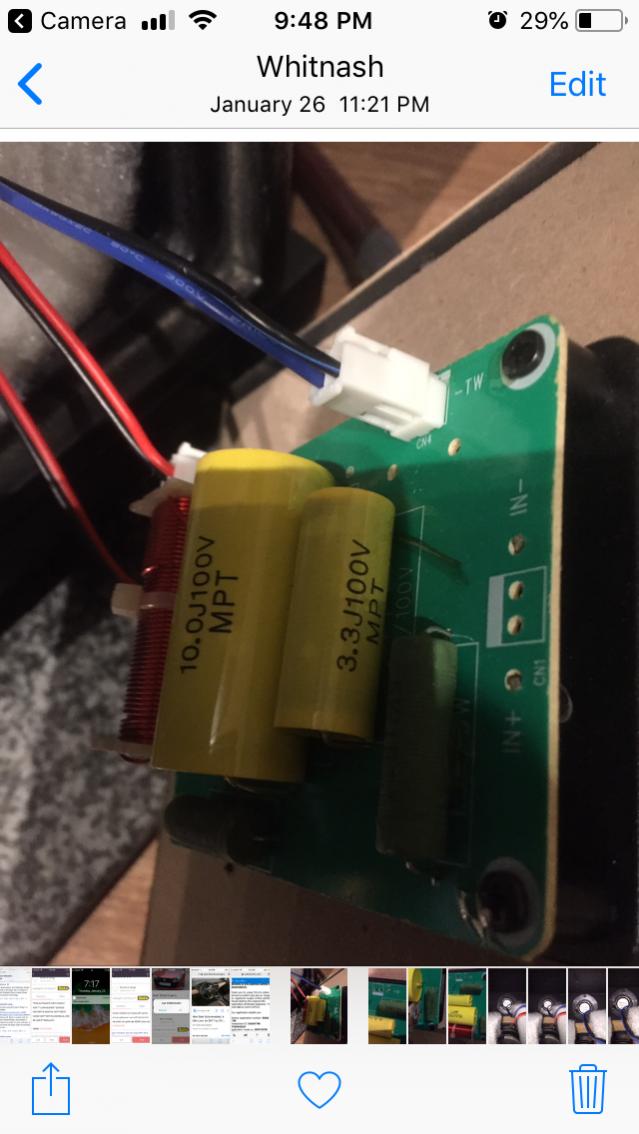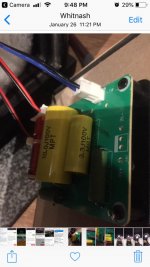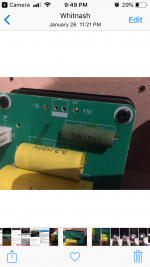Would I benefit from replacing the caps on the crossover board.
And what ones would be ideal
Those are polyester film capacitors, so they won't degrade much with use, or time.
But if you do replace them, use polypropylene types.
Last edited:
Thank you rayma so what would you recommend. I just think I could get some better caps what would I benefit. If anything I just hear so many people talk about crossover caps. Many thanks
what would you recommend. I just think I could get some better caps what would I benefit.
Not sure what's available in Europe, but MKP types are good in general,
if they are rated for enough current for speaker use.
Thanks again rayma What is the difference between mpt and mkp would you use the same value or increase or decrease. What would you say would be a good brand. Thanks ler
Personally, I don't think you would.Would I benefit from replacing the caps on the crossover board.
However, If you wish to experiment with high grade polypropylene caps, here's the UK supplier to got to.
Capacitors
What is the difference between mpt and mkp would you use
the same value or increase or decrease.
You must keep the same uF values (and similar or higher voltage ratings)
when replacing speaker capacitors. The MPT are generic metallized polyester film,
and the MKP are generic metallized polypropylene film. The brand more depends
on what's available to you readily.
Last edited:
MPT is a new one to me. Seems to be metallised polyester, which we used to call MKT (polyester). Slightly worse than MKP (polypropylene) in theory. 0.5% dissipation factor as compared to about 0.1%. This is a dielectric effect.
TBH, I can never hear any difference at all between all these plastic capacitors.
People never seem to upgrade ferrite coils. Now those ARE measureably worse than air coils. Must be because you usually need to measure them. 😀

Don't expect miracles.
TBH, I can never hear any difference at all between all these plastic capacitors.
People never seem to upgrade ferrite coils. Now those ARE measureably worse than air coils. Must be because you usually need to measure them. 😀
Don't expect miracles.
Thank you all. I am going to be replacing the caps. Could I go higher if side. And also the voltage.What would people use. What seems to be good replacement caps. Many thanks
I think I am wrong about those MPT capacitors. They are 100V polypropylene:
The tweeter filter is a 3.3uF and maybe a 1.5R resistor. Not too sure what the bass section is. It claims to be a 2.5way. Which doesn't make sense to me with a 4 element filter unless one mid is running fullrange, and the other gets some rolloff. You'd usually use something like 1mH and 10uF in a regular TMM bass filter.

Anyway, the main event is the 3.3uF if quality can be improved. But beware the exotic film caps are all bigger. For sure 400V seems to be most manufacturers choice. Hard soldering the connectors would be a good bit of technique too.
https://www.epos-loudspeakers.com/products/floor-standing-loudspeakers/k3/Further performance increases have been achieved with the implementation of high quality crossover components, including the selection of very high-grade polypropylene capacitors and metal oxide resistors. As standard, the K-Series comes pre-wired with Oxygen Free multi-stranded copper wire. Specially designed cable management holes inside the cabinet and high current connectors allow for aftermarket replacement cable sets to be installed, if required.
The tweeter filter is a 3.3uF and maybe a 1.5R resistor. Not too sure what the bass section is. It claims to be a 2.5way. Which doesn't make sense to me with a 4 element filter unless one mid is running fullrange, and the other gets some rolloff. You'd usually use something like 1mH and 10uF in a regular TMM bass filter.
Anyway, the main event is the 3.3uF if quality can be improved. But beware the exotic film caps are all bigger. For sure 400V seems to be most manufacturers choice. Hard soldering the connectors would be a good bit of technique too.
Well thank you so much system7 would you also replace the resistors. What are good makes out there. Thank you
Um, try Mundorf MKP's - Fairly cheap a little dark, but far smoother than average. About $7 each.
Plus, they really do break in, so the first 48 hours of listening you can hear some interesting stuff. 🙂
Best,
E
Plus, they really do break in, so the first 48 hours of listening you can hear some interesting stuff. 🙂
Best,
E
..would you also replace the resistors.
Yes.
..a lot more "bang for your buck" as well - it tends to directly effect clarity.
Duelund CAST Graphite Silver Resistors | Hifi Collective
Basically resistors 1st, iron core inductors 2nd (if any), cap's in critical positions 3rd.
My guess is that your cap's are fine, and do NOT need replacing - though you could run a "bypass" as Tony mentions on his site: Cornell Dubilier 940C / 0,01uF / 3000VDC, in an effort to squeeze-out a smidge more clarity.
I'm not fond of board-soldered crossover's. You could consider point-to-point wiring. You could go further and "pot" the whole thing with epoxy or higher temp. hard wax.
A bypass only works if it makes up a significant part of the value, otherwise it only works at 100 kHz+ frequencies. I have read in a paper about distortion in electrolytic capacitors (can't find it unfortunately) that 'significant' means something around 1/3 of the total value.
But if you add 1/2 of the current value to meet this requirement, the values are not correct anymore...
But if you add 1/2 of the current value to meet this requirement, the values are not correct anymore...
-that's if you are trying to reduce noise.
..the "bypass" in this case is more "tweaky" - meaning it isn't really known why some report a difference in this context. I have personally heard differences within various areas of a loudspeaker design with different effects when "by-passing", but *most* of the time I don't.
An obvious example is the low value Teflon bypass in (an other-wise) single-cap crossover for the tweeter (1st or 2nd electrical) - the difference is pretty obvious. (..and I wouldn't say it's "better" in every respect.)
..the "bypass" in this case is more "tweaky" - meaning it isn't really known why some report a difference in this context. I have personally heard differences within various areas of a loudspeaker design with different effects when "by-passing", but *most* of the time I don't.
An obvious example is the low value Teflon bypass in (an other-wise) single-cap crossover for the tweeter (1st or 2nd electrical) - the difference is pretty obvious. (..and I wouldn't say it's "better" in every respect.)
I was looking at some lcr caps are these any good or should I just go with Mundorf caps many thanks
I am also thinking off changing the resistors but I am struggling to find any 5w1r5j is there equivalent and if so. What should I be looking out for many thanks
Before you go anywhere else, it would be helpful if you could answer two questions.
1/ What is it, exactly, you are trying / hoping to achieve?
2/ What is wrong with the caps in your speaker at the moment?
You probably don't want to hear this, but I'm going to say it anyway: nobody, to the best of my knowledge, has ever heard a difference between reasonable quality MKP type caps in properly conducted blind listening tests.
Now, accepting that the above isn't entirely conclusive, it is true there can be some minor differences between MKP or alternative high quality capacitors; this is circumstance dependent & generally requires a very revealing system. Frankly, I suspect a pair of £1,500 Epos speakers, which while decent products for the money, aren't of that kind of resolution.
Component marketing is largely that: marketing. Very persuasive, very appealing in a 'magic bullet' sense, but overstates the case. Be that as it may, if you want to change the caps, to my mind there is zero point in changing them for another perfectly standard MKP, whatever the nominal voltage rating. You will hear nothing, unless you are told what you will hear, which instantly provides expectation bias. You will probably hear nothing changing them for anything else either, but if you're going to do it, the only real reason to do so would be if you were shifting to something with different construction. That means size, and money. The three nominal options would be a double-row non-inductive 'supercap' (don't get sucked in by the name, it just means it's a double-row design) such a Mundorf Supreme, Jantzen Superior Z cap or Audyn Plus. The next option would be a true film & foil which uses an independent foil layer rather than metallising the film. Examples of these are the Mundorf Zn, Audin KP SN, Musicap and Hovland offerings. Finally, paper in oil types, e.g. Jensen's offerings. The majority of these are extremely expensive options; probably cheapest is to use the Audyn Plus or KP SN. Paper in oil cap prices are through the roof and IMO you'd be wasting your time with the Epos. I think you're wasting your time & money, period, but it's your choice & if you believe you will hear a difference, then you may. Whether that's worth the coin & time only you can say.
1/ What is it, exactly, you are trying / hoping to achieve?
2/ What is wrong with the caps in your speaker at the moment?
You probably don't want to hear this, but I'm going to say it anyway: nobody, to the best of my knowledge, has ever heard a difference between reasonable quality MKP type caps in properly conducted blind listening tests.
Now, accepting that the above isn't entirely conclusive, it is true there can be some minor differences between MKP or alternative high quality capacitors; this is circumstance dependent & generally requires a very revealing system. Frankly, I suspect a pair of £1,500 Epos speakers, which while decent products for the money, aren't of that kind of resolution.
Component marketing is largely that: marketing. Very persuasive, very appealing in a 'magic bullet' sense, but overstates the case. Be that as it may, if you want to change the caps, to my mind there is zero point in changing them for another perfectly standard MKP, whatever the nominal voltage rating. You will hear nothing, unless you are told what you will hear, which instantly provides expectation bias. You will probably hear nothing changing them for anything else either, but if you're going to do it, the only real reason to do so would be if you were shifting to something with different construction. That means size, and money. The three nominal options would be a double-row non-inductive 'supercap' (don't get sucked in by the name, it just means it's a double-row design) such a Mundorf Supreme, Jantzen Superior Z cap or Audyn Plus. The next option would be a true film & foil which uses an independent foil layer rather than metallising the film. Examples of these are the Mundorf Zn, Audin KP SN, Musicap and Hovland offerings. Finally, paper in oil types, e.g. Jensen's offerings. The majority of these are extremely expensive options; probably cheapest is to use the Audyn Plus or KP SN. Paper in oil cap prices are through the roof and IMO you'd be wasting your time with the Epos. I think you're wasting your time & money, period, but it's your choice & if you believe you will hear a difference, then you may. Whether that's worth the coin & time only you can say.
Last edited:
- Status
- Not open for further replies.
- Home
- Loudspeakers
- Multi-Way
- Would I benefit from replacing caps.

